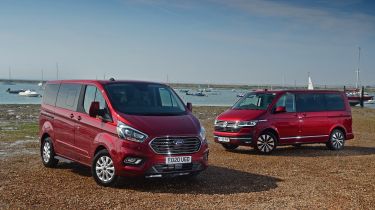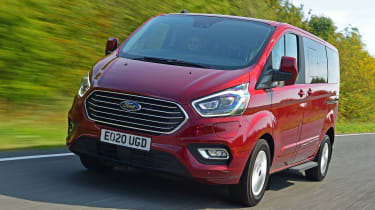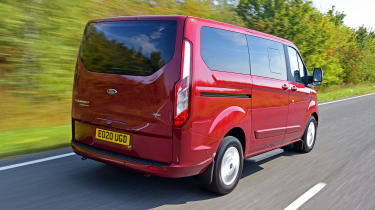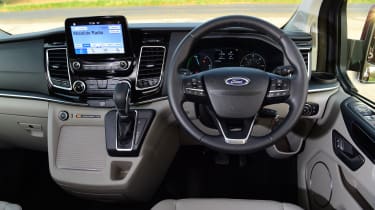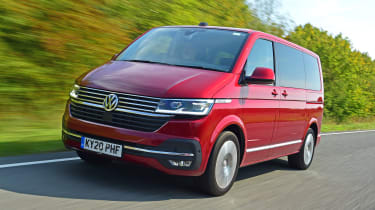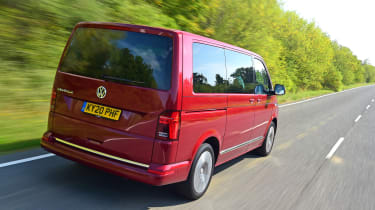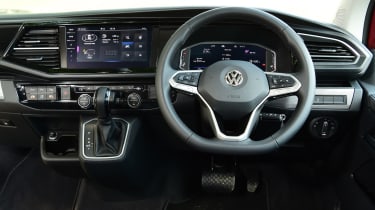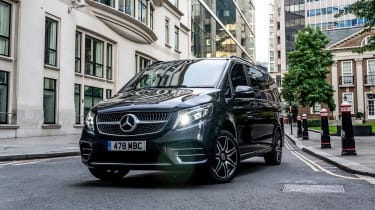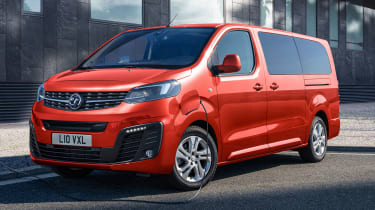Ford Tourneo Custom vs Volkswagen Caravelle
Passenger-carrying vans like the Ford Tourneo Custom PHEV and Volkswagen Caravelle aim to take the place of MPVs - but which is best?
While a lot of manufacturers like to paint their SUVs as lifestyle vehicles, if you have a big family, they can be a bit of a compromise when it comes to carrying capacity. Big 4x4s can certainly accommodate people and your possessions, but not necessarily both at the same time.
So what’s the alternative? In the past, the clear-cut option was an MPV, but with this sector in decline and not exactly the most stylish choice, could a van-based people carrier make a better option?
To find out, we’ve compared the latest multi-seat vans from Ford and Volkswagen. The Ford Tourneo Custom is the passenger carrying version of Ford’s mid-sized Transit Custom van, and we’re testing it here in new petrol-electric PHEV guise, with the petrol engine acting as a generator.
The VW Caravelle is powered by a traditional diesel engine, but like the Ford, this facelifted model is kitted out with high-quality materials and tech.
Do these van-based MPVs deliver the goods? And if so, does the Ford prove that plug-in hybrid tech suits these big machines best?
Ford Tourneo Custom
| Model: | Ford Tourneo Custom 1.0 EcoBoost PHEV Titanium |
| Price: | £61,000 |
| Engine: | Electric motor/1.0-litre 3cyl turbo, 124bhp |
| 0-62mph: | N/A |
| Test economy: | 25.8mpg/5.7mpl |
| CO2: | 81g/km |
| Annual road tax: | £465 |
The Ford Tourneo Custom is the passenger-carrying variant of the Transit Custom van. It uses the same engines, including the firm’s new plug-in hybrid option, and we’re testing it here in mid-spec Titanium trim, which costs £61,000.
Used - available now

2023 Audi
e-tron
39,863 milesAutomaticElectric
Cash £19,200
2025 Audi
Q5
25,432 milesAutomaticDiesel2.0L
Cash £28,200
2023 Land Rover
Range Rover Evoque
39,551 milesAutomaticPetrol1.5L
Cash £22,400
2021 SEAT
Arona
17,627 milesManualPetrol1.0L
Cash £12,087Design & engineering
We first saw the Transit Custom in 2012, and it was facelifted in 2018. It’s Ford’s medium-sized van, and the passenger-carrying version is the Tourneo Custom. It looks largely identical to the van, save for its extra windows and a grille with a couple of extra bars.
Van makers are switching to electric drive for their commercial vehicles, but Ford hasn’t gone the whole hog with a Transit EV (that comes in 2021). Instead, it has swapped the standard-issue 2.0-litre EcoBlue diesel found in the Transit Custom for a range-extending plug-in hybrid.
This means an electric motor drives the front wheels, while the 1.0 EcoBoost petrol engine acts as a generator when the modest 13.6kWh lithium-ion battery is flat. Thanks to the Tourneo Custom’s size, the hybrid drive system slots into the space vacated by the diesel engine and manual gearbox, while the battery is slung under the floor between the axles. This means interior space is the same as you’ll find in a diesel Tourneo Custom, although the system adds 200kg to the vehicle’s mass, so it’s quite heavy.
The Tourneo Custom offers driving modes to help you make best use of the power available. Auto EV is the standard hybrid mode that manages energy flow, but there is also an EV Now setting for electric-only running. EV Later is a save function that can be set up to work with geofencing, so you can run purely on electric power alone when you enter your local town or city centre. EV Charge allows you to top up the battery on the move, but it powers the electric motor at the same time, so it’s not an efficient way of driving and really impacts fuel economy.
Driving
The only indication that the Tourneo Custom PHEV is running at a standstill is a display on the dashboard showing how much battery charge is left. The engine will fire up when it drops down to zero per cent.
The Tourneo Custom has an automatic gearbox, so simply put the gear selector into drive and you’re away. At low speeds there’s a synthesised whirr that lets pedestrians know of your presence, but go faster and this is replaced by tyre noise.
While the Tourneo Custom has a relatively modest 124bhp, its 455Nm of torque is available the instant you press the accelerator. That means the Tourneo Custom is surprisingly quick off the line, and it’s faster than the Caravelle to respond at speeds up to 30mph. However, once past this initial surge, the diesel Volkswagen feels more consistent.
When the Tourneo Custom needs assistance from the engine, it cuts in discreetly. However, because it powers the electric motor and doesn’t directly drive the wheels, it instantly switches to max revs when you accelerate, so it produces a noticeable drone.
There’s a standard Drive setting for the gearbox and an ‘L’ mode, which offers more energy recovery when slowing, although it makes the Ford feel rather jerky when decelerating and it’s not effective enough for you to indulge in one-pedal driving.
Overall, the Tourneo Custom is relaxing, but it feels more van-like than the Caravelle. Big bumps send larger shockwaves through the frame, while the long wheelbase causes it bounce to over motorway expansion joints. There’s more road and wind noise than there is in the VW, so it’s not quite as relaxing.
Practicality
As well as delivering more cabin space than any conventional car or SUV, these van-based MPVs offer a commanding view of the road ahead. Many people buy SUVs for this feature, but the Tourneo Custom and Caravelle are even better.
These top-spec models also get plenty of extras to help you manoeuvre such big machines. The Ford features twin wing mirrors, with the lower section offering a wide-angle view (the Caravelle just has standard mirrors), while front and rear parking sensors are fitted as standard. You can also add a rear camera (£300), and kit such as rear cross-traffic alert, park assist and blind-spot alert.
Ownership
Neither Ford nor VW performed particularly well in our Driver Power dealer survey, but it’s worth noting that both of these models are actually sold via their respective manufacturer’s van dealer networks. Ford has its Transit Centres, while VW has Van Centres. These dealers should have specialist knowledge on commercial vehicles, giving greater peace of mind.
When it comes to safety, these vans are tough, but don’t quite match conventional cars for safety kit. Many safety features (even additional side airbags) are optional, although both models feature automatic emergency braking as standard.
Running costs
Ford claims an electric-only range of 33 miles for the Tourneo Custom’s fully charged 13.6kWh battery, but we only saw a usable range of 20 miles.
On test we managed 25.8mpg from a full battery and a tank of fuel, but this did include a significant number of motorway miles, which definitely had an impact on our returns. In comparison, the Caravelle returned 34.4mpg. Either way, it’s clear that charging the Tourneo Custom’s battery as frequently as possible and using the energy-recuperating ‘L’ mode when driving will maximise fuel economy.
Charging is done via the nearside socket; it takes five-and-a-half hours from a three-pin plug or three hours from a wallbox. The PHEV has a standard Type 2 connection and no rapid-charge option.
Testers’ notes
“Buttons on dash turn the ESP off for slippery conditions, switch between electric drive modes, toggle the parking sensors, and add park assist”
Volkswagen Caravelle
| Model: | Volkswagen Caravelle 2.0 TDI 199 DSG Executive |
| Price: | £58,071 |
| Engine: | 2.0-litre 4cyl diesel, 196bhp |
| 0-62mph: | 10.1 seconds |
| Test economy: | 34.4mpg/7.6mpl |
| CO2: | 219-242g/km |
| Annual road tax: | £475 |
The Caravelle’s ancestry can be traced back to Volkswagen’s origins. It’s based on the T6 Transporter, which is the company’s sixth-generation van, the first being the Beetle-derived Type 2 from 1950. Here we try the 197bhp 2.0 TDI, DSG auto Executive model, which costs £58,071.
Design & engineering
While the Caravelle has an illustrious lineage, the current model is a thoroughly up-to-date machine. The T6 Transporter van arrived in 2016 – although it can trace its roots to the previous T5 launched in 2003 – while a facelift to T6.1 spec at the start of this year introduced a new look and technology from VW’s passenger cars.
An all-electric e-Transporter has joined the van range, but the passenger-carrying Caravelle still relies on diesel power. It uses a 2.0 TDI in 148bhp or 196bhp guises (we’re testing the latter here because it more closely matches the Ford’s price, but is still £2,929 cheaper), and all models come with a seven-speed DSG twin-clutch gearbox. This sends drive to the front wheels, while the higher-powered diesel is available with 4MOTION four-wheel drive, but only in top-spec Executive trim.
The Caravelle is marginally smaller than the Tourneo Custom, but it’s still a sizeable machine. Thankfully, there are a host of driver aids fitted to the VW to help you with manoeuvring. Like the Tourneo Custom, this top-spec Executive model features front and rear parking sensors, but it also comes with VW’s park assist steering and a rear camera. The inclusion of park assist also unlocks another useful feature in the shape of side assist, which warns you of objects that might be in your blind spot.
Adaptive cruise control is also fitted as standard (it’s not available on the Tourneo Custom), while this Executive model benefits from the Digital Cockpit and Discover Media infotainment seen in VW’s passenger car range. Overall, quality inside is a step ahead of the Ford, although both models show off their van roots with more hard plastics than you would normally get in a car or an MPV.
Driving
There are distinct differences between the Caravelle and the Tourneo Custom when it comes to how they drive, due to their different drivetrain configurations. While the Ford’s engine note is unrelated to your speed or acceleration, the VW
has a diesel rumble when you apply the throttle.
With 196bhp on tap, the Caravelle is surprisingly rapid. A 0-62mph time of 10.1 seconds is quick for such a big, heavy machine, although the slick-shifting DSG gearbox is a little slow to react when pulling away from a standstill, almost as if it’s slipping so as to not stress the transmission. Still, once you’re up and running, the box’s crisp shifts make the most of the engine’s torque.
On the move, the Caravelle delivers a smoother ride than the Tourneo Custom. It still thumps into potholes like the Ford, but while they’re heard, they’re not felt as severely. The VW is also more refined, with less tyre noise (even on the optional 18-inch wheels fitted to our test car) and not as much wind or engine noise either. The 2.0 TDI has a torquey power delivery, and the VW feels more accomplished than the Ford at speed.
Our car also featured the £1,182 Drive Select dynamic chassis control system, which seems a little overkill in a vehicle where comfort and refinement are the keys to the Caravelle package. As a result, we tended to stick with the Comfort setting over Sport, although Eco is also available to help reduce fuel consumption.
Practicality
While the Caravelle is a seven-seater compared to the Tourneo Custom’s eight-seat layout, both cars still deliver plenty of practicality. Each car has four Isofix child seat mounts in the back, although VW and Ford advise to only use the attachments in the second row when the seats are facing forwards.
It’s level-pegging between these two for storage. The Tourneo Custom has more hidden space, with a glovebox, two lidded cubbies on top of the dash (one with USB and 12V sockets) and a large central bin with twin cup-holders, although we would like to have seen the dash-mounted USB socket hidden inside, rather than just above the lid.
Both models feature deep door bins and cup holders everywhere, while the Tourneo Custom also features some overhead storage.
Ownership
These two people carriers offer bucketloads of versatility, but it comes at a price. The Caravelle isn’t as expensive as the £61,000 Tourneo Custom, but at £58,071 it’s still steep for what many would consider to be simply a van with windows. Good standard kit goes some way to justifying the price, although you can bump that up even further with a number of options, including two-tone paint (£2,880), Nappa leather starting from £1,482, or even a ‘Good Night’ package (£462), which includes a bed covering and window blinds.
Running costs
Steep prices mean both cars are liable for the £325 road tax surcharge for the first five years, although the Tourneo Custom costs £10 less at £465, thanks to its classification as an alternative-fuel vehicle.
It’s also the better choice as a company car, because emissions of 81g/km place it in the 19 per cent Benefit in Kind tax bracket, compared to 37 per cent for the Caravelle. It’ll cost top-rate earners £4,624 a year; the VW comes in at £8,313.
Both cars have 70-litre fuel tanks, but the Caravelle’s can be upgraded to 80 litres for £78, which adds roughly 70 more miles of range,
based on our test economy of 34.4mpg.
Testers’ notes
“Executive trim adds electrically operated sliding doors that are opened via dash buttons or the keyfob, plus a very useful powered tailgate.”
Verdict
First place: Volkswagen Caravelle
With its flexible seating layout, cruising comfort and punchy performance, the VW Caravelle takes victory here. It has its vices – chiefly the hesitant gearbox – but overall it feels like a higher-quality product than the Ford, while the technology on offer is impressive. Yes it’s expensive, but if you need a multi-seat car that can carry passengers and kit, it’s the model we’d choose.
Second place: Ford Tourneo Custom
The Tourneo Custom offers some advantages over the VW and is a spacious people carrier with handy features, but the PHEV model only comes into its own if you can charge it up every time you park it. Do this – and undertake lots of short journeys – and you’ll reap the benefits. But if you’re using it as a lifestyle vehicle on longer trips, you’d be better served by one of the diesel variants.
Also consider...
- Model: Mercedes V 300 d Sport
- Price: £59,115
- Engine: 2.0-litre 4cyl, 239bhp
The V-Class is another mainstay of the VIP shuttle fraternity. This V 300 d manages 0-62mph in a faintly ridiculous 7.8 seconds, while the less powerful V 220 d is also on offer. Both come in three body lengths with up to eight seats in various layouts.
- Model: Vauxhall Vivaro-e Life Elite
- Price: £49,415
- Drive: Electric motor, 136bhp
If you’re looking for an eco-friendly option, then Vauxhall has added a passenger version of its new Vivaro-e van. It’s available with up to nine seats and in two body lengths, while the 50kWh battery means there’s up to 143 miles of range.
Figures
| Volkswagen Caravelle 2.0 TDI 199PS DSG Executive | Ford Tourneo Custom 1.0 EcoBoost PHEV Titanium | |
| On the road price/total as tested | £58,071/£63,345 | £61,000/£64,330 |
| Residual value (after 3yrs/36,000) | £25,029/43.1% | £22,692/37.2% |
| Depreciation | £33,042 | £38,308 |
| Annual tax liability std/higher rate | £4,156/£8,313 | £2,312/£4,624 |
| Annual fuel cost (12k/20k miles) | £1,876/£3,127 | £2,423/£4,039 |
| Insurance group/quote/VED | 33/£632/£475 | N/A/£372/£465 |
| Cost of 1st/2nd service | £399 (2 services) | £220/£320 |
| Length/wheelbase | 4,904/3,000mm | 4,972/2,933mm |
| Height/width | 1,950/1,904mm | 1,979/1,986mm |
| Powertrain | 4cyl in-line/1,968cc | Electric motor/3cyl in-line REx, 999cc |
| Peak power/revs | 196/3,800 bhp/rpm | 124/N/A bhp/rpm |
| Peak torque/revs | 450/1,400 Nm/rpm | 455/N/A Nm/rpm |
| Transmission | 7-spd auto/fwd | Single-spd auto/fwd |
| Fuel tank/AdBlue/spare wheel | 70/13 litres/yes | 70 litres/N/A/yes |
| Max cargo volume | 5.8 cubic metres | 6.0 cubic metres |
| Kerbweight/payload/towing weight | 2,410/670/2,500kg | 2,601/639kg/N/A |
| Turning circle | 11.9 metres | 11.6 metres |
| Basic warranty (miles)/recovery | 3 yrs (100k)/3yrs | 3yrs (unltd)/3yrs |
| Driver Power manufacturer/dealer pos | 19th/22nd | 24th/23rd |
| NCAP: Adult/child/ped./assist/stars | N/A | 84/90/48/71/5 (’12) |
| 0-62mph/top speed | 10.1 secs/124mph | N/A/75mph |
| Auto Express econ (mpg/mpl)/range | 34.4/7.6/530 miles | 25.8/5.7/397 miles |
| WLTP combined | 30.7-33.6mpg | 78.5mpg |
| WLTP combined | 6.8-7.4mpl | 17.3mpl |
| Actual/claimed CO2/tax bracket | 220/219-242g/km/37% | 253/81g/km/19% |
| Airbags/Isofix/park sensors/camera | Two/four/yes/yes | Six/four/yes/£300 |
| Auto box/lane keep/blindspot/AEB | Yes/£906*/£906*/yes | Yes/£402/£192/yes |
| Climate control/adaptive cruise | Yes/yes | No/no |
| Leather/heated seats | £1,482+/front | £828/yes |
| Metallic paint/LED lights | £762/yes | £780/no |
| Keyless entry & go/power doors | No/yes | No/no |
| Sat-nav/digital dash | Yes/yes | No/no |
| DAB/connected services | Yes/yes | Yes/yes |
| USB sockets/CarPlay/Android Auto | Six/wireless/yes | Eight/yes/yes |
